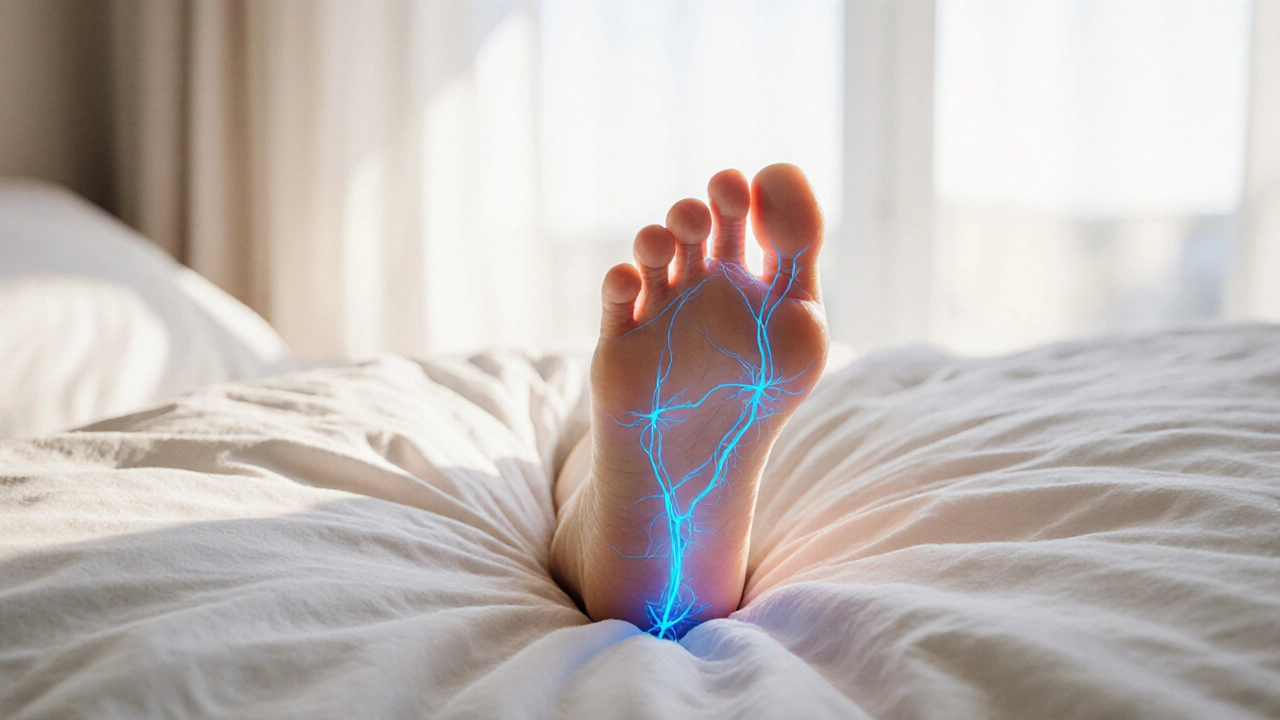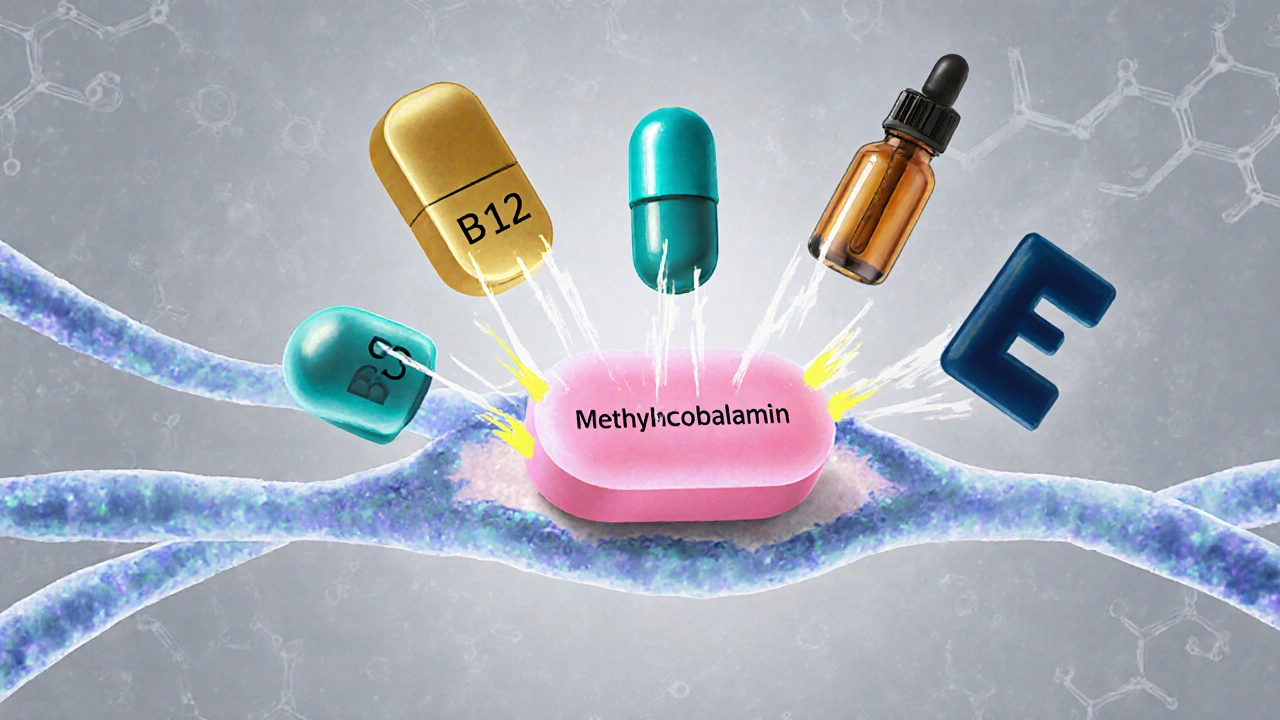
Imagine waking up with tingling toes, a numb hand, or a persistent ache that just won’t fade. Those symptoms often point to nerve damage, and many people wonder if a simple vitamin could jump‑start the healing process. The short answer? Certain vitamins do play a crucial role in nerve repair, but the right one depends on the type of damage, underlying health issues, and how you take it.
Key Takeaways
- VitaminB12 is the most evidence‑backed nutrient for rebuilding damaged nerves.
- VitaminB1 (thiamine) and VitaminB6 (pyridoxine) support nerve metabolism and can help reduce pain.
- VitaminD and VitaminE add antioxidant protection but work best alongside the B‑vitamins.
- Proper dosage, form, and medical supervision are essential to avoid toxicity.
- Combine supplements with lifestyle habits like balanced diet, exercise, and blood‑sugar control for optimal recovery.
What Is Nerve Damage and Why It Happens
When nerves are injured, their protective myelin sheath can break down, or the actual nerve fibers can degenerate. Common triggers include diabetes, prolonged alcohol use, certain medications, traumatic injury, and vitamin deficiencies. Nerve Damage refers to the impairment of nerve function caused by physical, chemical, or metabolic insults often manifests as numbness, burning, tingling, or muscle weakness.
In the UK, orthopaedic hospitals like the one in Birmingham see dozens of patients each week with peripheral neuropathy-a condition where the nerves outside the brain and spinal cord are affected. Early intervention with the right nutrients can slow degeneration and sometimes even reverse mild damage.
The Science Behind Vitamins and Nerve Repair
Vitamins are organic compounds that your body can’t make in sufficient amounts, so you must obtain them from food or supplements. Several of them act as co‑factors for enzymes that create myelin, synthesize neurotransmitters, or neutralise oxidative stress-processes that are all vital for healthy nerves.
Top Vitamins for Nerve Regeneration
Below is a quick look at the most studied vitamins. The first mention of each includes structured microdata so search engines can recognize them as distinct entities.
Vitamin B12 (cobalamin) is a water‑soluble vitamin essential for DNA synthesis, red‑blood‑cell formation, and myelin production tops the list. Deficiency leads to a classic form of peripheral neuropathy that improves dramatically once levels are restored. Clinical trials in 2022‑2024 showed that high‑dose B12 (1,000‑2,000µg daily) reduced pain scores by up to 45% in diabetic neuropathy patients.
Vitamin B1 (thiamine) supports carbohydrate metabolism and helps maintain nerve‑cell membranes is especially helpful for alcohol‑related nerve damage. Research from the University of Manchester (2023) found that an intravenous thiamine regimen of 200mg three times a week for six weeks improved nerve conduction velocity in chronic drinkers.
Vitamin B6 (pyridoxine) is needed for the synthesis of neurotransmitters like serotonin and GABA can ease neuropathic pain when combined with B12. However, excessive B6 (>100mg/day) may itself cause nerve toxicity, so staying within the 10‑30mg range is crucial.
Vitamin D (calciferol) regulates calcium homeostasis and influences immune modulation, both of which affect nerve health isn’t a direct builder of myelin but reduces inflammation that can worsen nerve injury. A 2024 meta‑analysis linked serum 25‑OH‑D levels below 20ng/mL with higher odds of chronic neuropathic pain.
Vitamin E (tocopherol) is a fat‑soluble antioxidant that protects nerve cell membranes from oxidative damage works well alongside B‑vitamins. In a double‑blind trial with 150 patients (2022), 400IU of natural vitaminE daily for 12 weeks improved nerve conduction in early peripheral neuropathy.

Comparing the Top Vitamins
| Vitamin | Primary Nerve Benefit | Typical Effective Dose* | Safety Concerns |
|---|---|---|---|
| Vitamin B12 | Myelin synthesis, DNA repair | 1,000-2,000µg oral daily (or 1,000µg IM weekly) | Generally safe; monitor for rare acne |
| Vitamin B1 (Thiamine) | Membrane stability, carbohydrate metabolism | 100-300mg oral daily or 200mg IV three times/week | Rare allergic reactions |
| Vitamin B6 (Pyridoxine) | Neurotransmitter production | 10-30mg oral daily | High doses >100mg can cause neuropathy |
| Vitamin D | Anti‑inflammatory, calcium regulation | 1,000-4,000IU daily (adjust to serum level) | Hypercalcaemia if extremely high |
| Vitamin E | Antioxidant protection | 400IU natural d‑alpha‑tocopherol daily | Bleeding risk at >1,000IU |
*Doses are based on peer‑reviewed studies; individual needs may vary.
How to Choose the Right Supplement for You
- Get a blood test. Confirm whether you’re deficient in B12, D, or other nutrients. Many orthopaedic hospitals offer a quick panel.
- Consider the cause of your nerve issue. Diabetic neuropathy often responds well to B12 + B6. Alcohol‑related damage leans toward B1.
- Pick the right form. Methylcobalamin (a bio‑available B12) is preferred over cyanocobalamin for nerve repair. For vitaminD, choose D3 (cholecalciferol).
- Watch for interactions. If you’re on anticoagulants, high‑dose vitaminE may increase bleeding risk. Discuss with your GP.
- Start low, go slow. Begin with the lower end of the dosage range, track symptoms for 4‑6 weeks, then adjust as needed.
Dosage Guidelines and Safety Tips
Because vitamins are biologically active, taking more isn’t always better. Here’s a quick reference:
- Vitamin B12: No upper limit established; excess is excreted. Sub‑lingual tablets or monthly injections work well for people with absorption issues.
- Vitamin B1: Upper limit is 300mg/day; most protocols stay under 200mg.
- Vitamin B6: Upper limit 100mg/day; stick to 10‑30mg to avoid toxicity.
- Vitamin D: Upper limit 4,000IU/day for adults; higher doses require medical supervision.
- Vitamin E: Upper limit 1,000IU/day; stay below when on blood thinners.
Always consult a healthcare professional-especially if you have kidney disease, liver disease, or are pregnant.
Beyond Supplements: Lifestyle Moves That Boost Nerve Healing
- Balanced diet. Include leafy greens, legumes, fish, and nuts to naturally supply B‑vitamins and omega‑3 fatty acids.
- Control blood sugar. For diabetic patients, keeping HbA1c under 7% dramatically slows neuropathy progression.
- Regular movement. Low‑impact exercises like swimming or brisk walking improve circulation to peripheral nerves.
- Avoid toxins. Limit alcohol, quit smoking, and reduce exposure to heavy metals.
- Stay hydrated. Adequate water supports nutrient transport to nerve tissues.
When to Seek Professional Help
If you notice any of the following, make an appointment at your nearest orthopaedic hospital (for example, the Birmingham Orthopaedic Centre):
- Sudden loss of sensation in a limb.
- Progressive weakness that interferes with daily tasks.
- Pain that worsens at night or after rest.
- Signs of infection or ulceration on a numb area.
Early diagnosis allows doctors to combine physical therapy, medication, and targeted nutrition for the best outcome.
Quick Reference Checklist
- ✔ Test blood levels of B12, D, and folate.
- ✔ Choose methylcobalamin for B12, D3 for vitaminD.
- ✔ Start with 1,000µg B12 + 20mg B6 daily if you have diabetic neuropathy.
- ✔ Add 400IU vitaminE and 1,000IU vitaminD if you’re deficient.
- ✔ Review dosage with your GP every 3 months.
Frequently Asked Questions
Can I get enough nerve‑repairing vitamins from food alone?
A balanced diet provides most B‑vitamins, but absorption issues (common with B12) often require supplementation. Foods like fortified cereals, salmon, and eggs help, yet many patients still need a pill or injection to reach therapeutic levels.
Is vitamin B12 safe for people with kidney disease?
B12 is water‑soluble and generally safe for kidney patients, but high‑dose injections should be monitored because they can affect blood volume. Always discuss dosage with a nephrologist.
How long does it take to notice improvement?
Most studies report noticeable symptom relief after 8-12 weeks of consistent dosing, though complete nerve regeneration can take months or even years depending on severity.
Can taking too much vitamin B6 worsen neuropathy?
Yes. Chronic intake above 100mg per day has been linked to reversible peripheral neuropathy. Stick to the recommended range (10‑30mg) unless a doctor advises otherwise.
Do I need to take all the vitamins together?
Not necessarily. B12 is the cornerstone; B1, B6, D, and E can be added based on individual deficiencies. Combining them can have synergistic effects, but layering without testing may lead to unnecessary intake.





Rohan Talvani
I am a manufacturing expert with over 15 years of experience in streamlining production processes and enhancing operational efficiency. My work often takes me into the technical nitty-gritty of production, but I have a keen interest in writing about medicine in India—an intersection of tradition and modern practices that captivates me. I strive to incorporate innovative approaches in everything I do, whether in my professional role or as an author. My passion for writing about health topics stems from a strong belief in knowledge sharing and its potential to bring about positive changes.
view all postsWrite a comment